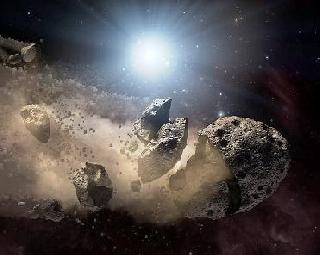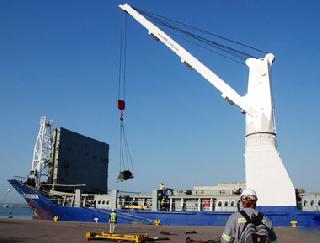
Photo: NASA.
LONDON (PTI): A massive asteroid could crash into Earth in 2182, causing widespread devastation and possible extinction, scientists have warned.
The asteroid, called 1999 RQ36, has a one-in-thousand chance of actually hitting the Earth, but half of that risk corresponds to a potential impact in the year 2182, scientists from the Universidad de Valladolid in Spain claimed.
The astronomers, who used mathematical models to calculate the risk of asteroid 1999 RQ36 slamming into Earth through the year 2200, found two potential opportunities for the asteroid to hit Earth in 2182.
"The total impact probability of asteroid '(101955) 1999 RQ36' can be estimated in 0.00092 -- approximately one-in-a-thousand chance -- but what is most surprising is that over half of this chance (0.00054) corresponds to 2182," said Maria Eugenia Sansaturio, who led the research.
The asteroid, which is about 1,800 feet in diameter, was discovered in 1999 and currently it is behind the Sun. It can be observed only in the spring of 2011, the Daily Mail reported.
If an asteroid of this size hit the Earth it would cause widespread devastation and possible mass extinction, said the scientists.
They said any attempt to try and divert the asteroid and save the Earth will have to take place more than 100 years before it is due to hit to have any chance of success.
If the asteroid had not been spotted until after 2080 it would be impossible to divert it from its target, they warned in a new research paper published in the science journal 'Icarus'.
Asteroid 1999 RQ36 is part of the Potentially Hazardous Asteroids (PHA) group, which all have the possibility of hitting the Earth due to their orbits and are all considered likely to cause damage.
Even though the asteroid's orbit is well-known thanks to 290 different observations by telescopes and 13 radar measurements there is uncertainty about its path because of the so-called Yarkovsky effect.
This effect, first discovered in 2003 and named after a Russian engineer, is produced by the way an asteroid absorbs energy from the sun and re-radiates it into space as heat.
This can subtly alter the asteroid's flight path.
"The consequence of this complex dynamic is not just the likelihood of a comparatively large impact, but also that a realistic deflection procedure (path deviation) could only be made before the impact in 2080, and more easily, before 2060," said Sansaturio.
She also added, "if this object had been discovered after 2080, the deflection would require a technology that is not currently available.
"Therefore, this example suggests that impact monitoring, which up to date does not cover more than 80 or 100 years, may need to encompass more than one century.
"Thus, the efforts to deviate this type of objects could be conducted with moderate resources, from a technological and financial point of view."
Scientists believe the impact from the asteroid that created the famous Chicxulub crater in Mexico would have caused 'mega-tsunamis' many thousands of feet high. It is believed that this asteroid led to the extinction of the dinosaurs.
There have been deliberations going on since long to find out ways to deflect potentially hazardous asteroids to prevent them from hitting Earth.
One of the more popular methods is to detonate a nuclear warhead on an approaching asteroid to deflect it from its orbital path.
 Previous Article
Previous Article Next Article
Next Article













The Indian Air Force, in its flight trials evaluation report submitted before the Defence Ministry l..
view articleAn insight into the Medium Multi-Role Combat Aircraft competition...
view articleSky enthusiasts can now spot the International Space Station (ISS) commanded by Indian-American astr..
view article